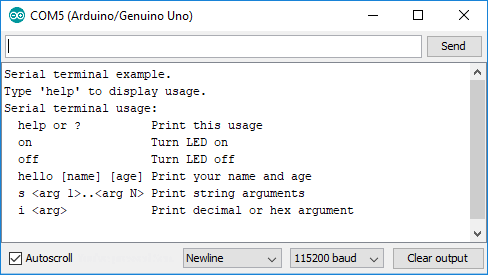 |
Erriez Serial Terminal library for Arduino
1.1.2
This is a Serial Terminal library for Arduino.
|
 |
Erriez Serial Terminal library for Arduino
1.1.2
This is a Serial Terminal library for Arduino.
|
This is a universal Serial Terminal library for Arduino to parse ASCII commands and arguments.

Any Arduino hardware with a serial port.
Arduino IDE | Examples | Erriez Serial Terminal |
Initialization
Create a Serial Terminal object. This can be initialized with optional newline and delimiter characters.
Default newline character: '\n' Default delimiter character: Space
Register new commands
Commands must be registered at startup with a corresponding callback handler . This registers the command only, excluding arguments.
The callback handler will be called when the command has been received including the newline character.
An example of registering multiple commands:
Set default handler
Optional: The default handler will be called when the command is not recognized.
Read from serial port
Read from the serial port in the main loop:
Get next argument
Get pointer to next argument in serial receive buffer:
Get remaining characters
Get pointer to remaining characters in serial receive buffer:
Clear buffer
Optional: The serial receive buffer can be cleared with the following call:
SerialTerminal.h contains the following configuration macro's:
ST_RX_BUFFER_SIZE : The default serial receive buffer size is 32 Bytes. This includes the command and arguments, excluding the '\0' character.ST_NUM_COMMAND_CHARS: The default number of command characters is 8 Bytes, excluding the '\0' character.Please refer to the Wiki page.
 1.8.13
1.8.13